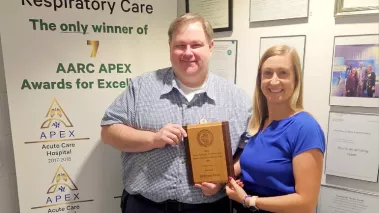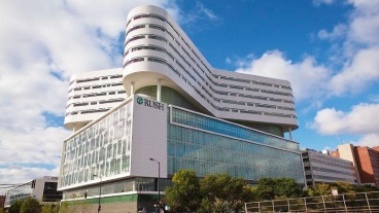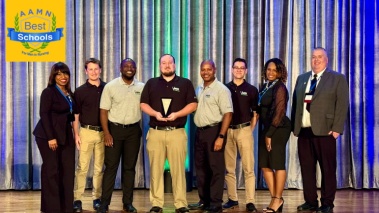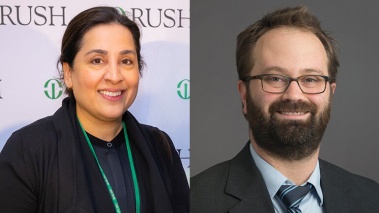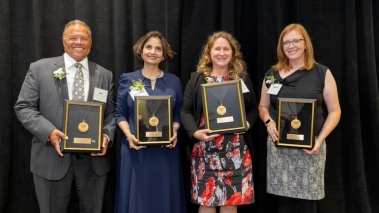When the COVID-19 pandemic arrived to Chicago in March, students across Rush University were eager to find ways to help their neighbors, fellow health care workers and the most vulnerable members of our community. Quickly recognizing there was a need to help the homeless population, a group of Rush Medical College students approached their faculty advisors to see how they could help. The group, led by Joseph Hennessy, MD, assistant professor in the Department of Internal Medicine, set up a program to screen residents at Franciscan Outreach for COVID-19.
“I think it became very clear to me and other folks that COVID-19 would deeply affect those who were most marginalized,” said Shaina Shetty, MD who graduated from the medical college in April. “We recognized that a lack of housing is a manifestation of so many structural and systemic inequities and there are so few protections in place. And honestly for the first few weeks of COVID, I felt pretty overwhelmed by that recognition. When I heard about the screening efforts at Franciscan Outreach, it felt like one small way to help mediate the spread of COVID-19 in shelter spaces and support my very first patients.”
Rush has a long-standing relationship with Franciscan Outreach, an organization that provides a variety of services for the homeless population in Chicago. Through the Rush Community Service Initiatives Program, volunteers run a weekly clinic for the residents at Franciscan Outreach to treat cuts, bruises and other minor conditions. Overseen by an attending physician, the clinic is entirely student-run with an interdisciplinary group of volunteers from the medical college, nursing college, physician assistant studies and health management systems programs. Once COVID-19 hit the city, the clinic was put on hold.
“Normally, there are 250-300 people at the shelter in beds back to back,” Hennessy described. “Everyone is so close that you can’t walk between the beds. If one person were to get sick with COVID-19, everyone would become sick very quickly. The set-up was a recipe for disaster.”
To help prevent the potential spread of COVID-19, half of the residents of Franciscan Outreach were moved to nearby Rauner YMCA, which had been shut down due to the pandemic. Cots were purchased and spread six feet apart to ensure safe social distancing for all residents.
Shetty and her classmates Samantha Chao, Jessica Chin, Alison Graebner, Lakshmi Sundaresan and Wendy Tian, decided to volunteer at the Franciscan locations to help with COVID-19 screening efforts. They were initially responsible for checking the temperature of each resident and asking a few questions to assess COVID-19 exposure. If the screening indicated an exposure was possible, the resident was immediately isolated and asked follow up questions by Dr. Hennessy to determine if these were new symptoms or symptoms of an existing condition.
The volunteers quickly acknowledged that the residents had many health-related needs beyond COVID-19 screenings and took the initiative to begin meeting with the residents to find out what medications they were taking, help them find primary care doctors and schedule appointments. The volunteers also went to a local Walgreens to set up a system with the pharmacy so medications could be delivered directly to the shelter for the residents.
“The graduated fourth-year medical students have taken over the screenings at YMCA and have been spectacular,” said Hennessy. “The shelter population is tough—there’s a lot of mistrust and some have just been released from jail. The volunteers have gotten to know all of the residents by name and now the residents look forward to interacting with the ladies because they know that they can trust and rely on the volunteers for help.”
After a few weeks at the YMCA, the volunteer group noticed a shift in the residents. “Folks started telling us they were growing tired, feeling increasingly anxious, down or bored. Residents in the shelter have limited belongings, which makes sheltering in place really hard,” said Shetty. “We started a small GoFundMe and approached local businesses for donations. The response was incredible – OpenBooks Chicago dropped off three boxes of books for us, including one box of Spanish books, which was especially needed. A local Polish bookstore shared the ask and we received five boxes of Polish books through their network. The residents have also started an informal lending library for the days we aren’t there.”
With the beginning of residency a few weeks away, the volunteers are working to set up a system to smoothly transition their work to first- and second-year medical students. “This group chose to stay in Chicago between medical school and residency to help take care of 150-180 people at the YMCA every day.” Hennessy said. “They postponed everything – vacations, graduation parties – to stay here and help the less fortunate. They’re compassionate, nonjudgmental and are always looking for new ways to help. They’re going to be an incredible group of physicians.”
“I am very grateful for the group of M1, M2 and health professional students that have managed volunteer schedules and helped keep our screening team protected with PPE, including Cary Anne Kane, Jonathan Bauer, Sarah Hamilton, Jacob Weber, Dido Ivanov, Stephanie Moss and Sara Louise Dawson,” said Shetty. “These last six weeks have been hard and folks have lost so much during this pandemic. There are new faces every time we go back to the shelter and we’re often asked when this will end, when people can go back to their jobs or visit loved ones. I think I’ve found hope in the relationships we’ve been able to build, watching those relationships transition into a moment for a resident to consider his own health, to set up an appointment with a primary care provider or to seek support with therapy. I believe we are building something that lasts beyond this pandemic, at least for a few folks.”



